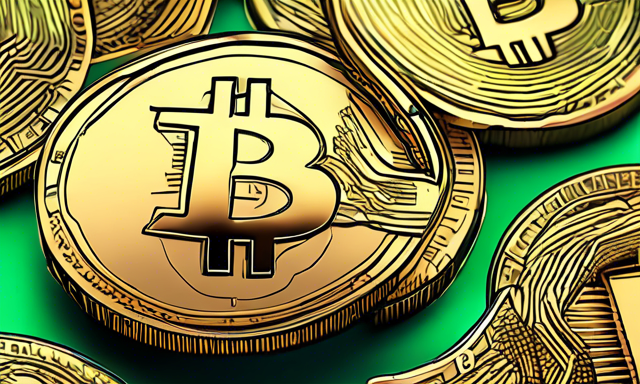The Growing Hostility Towards Cryptocurrency in Nigeria: A Comprehensive Overview
Nigeria, the leading cryptocurrency market in Africa below the Sahara, has been facing increasing hostility towards digital assets in recent years. The country has witnessed significant changes in its regulatory environment concerning cryptocurrency trading, leading to a challenging landscape for individuals and firms involved in the crypto space. The Central Bank of Nigeria’s wavering stance on Bitcoin, from a ban on crypto transactions in February 2021 to a partial lift three years later, reflects the tumultuous nature of the regulatory climate in the country.
A Shift in Regulatory Dynamics: The Ripple Effect on Crypto Trading
Authorities in Nigeria have intensified their crackdown on international cryptocurrency exchanges, leading to prominent players like OKX and Kucoin exiting the market due to regulatory uncertainties. The recent imposition of a 7.5% value-added tax on transactions by Kucoin further highlights the challenges faced by crypto traders in Nigeria. Moreover, directives from the Nigerian Securities and Exchange Commission (SEC) to delist naira pairs on crypto platforms have further compounded the situation, restricting access to traditional trading avenues.
Peer-to-Peer Trading: A Resilient Market Amidst Regulatory Turmoil
- Despite the crackdown on centralized exchanges, peer-to-peer crypto trading continues to thrive in Nigeria, emphasizing the resilience of the market.
- Nigeria’s enforcement actions against international exchanges reflect the authorities’ attempts to regulate the crypto space but have inadvertently led to a surge in alternative trading methods.
- The regulatory pressure on traditional exchanges has fueled a shift towards decentralized platforms and social media channels for crypto transactions.
Regulatory Bodies at Odds: The Impact on Nigeria’s Cryptocurrency Landscape
Nigeria’s regulatory bodies, including the Central Bank of Nigeria (CBN) and the Securities and Exchange Commission (SEC), have been embroiled in conflicting approaches towards cryptocurrency regulation. The country’s oscillation between endorsing financial innovation and imposing restrictions on crypto activities has created uncertainty in the market. The CBN’s attempts to curb inflation and counterfeiting through redesigning the naira notes have inadvertently led to cash shortages and economic instability, further complicating the regulatory landscape.
Evolution of Nigeria’s Regulatory Climate: A Bumpy Ride for Crypto Enthusiasts
The historical trajectory of Nigeria’s regulatory environment for cryptocurrencies showcases a series of conflicting directives and regulatory shifts:
- January 2017: CBN issues an advisory warning against investing in Bitcoin, citing volatility and risks associated with unregulated assets.
- February 2018: CBN reiterates its warnings on virtual currencies amidst rising Bitcoin prices and increasing mainstream interest.
- February 2021: CBN bans Bitcoin and crypto transactions, alleging links to organized crime and money laundering activities.
- October 2021: Nigerian crypto community challenges the legality of CBN’s ban on digital currency transactions.
- October 2021: CBN introduces e-Naira, a central bank digital currency, to stimulate economic growth but faces limited uptake among the population.
The Ongoing Binance Saga: Ramifications for Nigeria’s Crypto Industry
- Nigeria’s allegations against Binance, including money laundering, currency speculation, and tax evasion, have strained the relationship between the exchange and the government.
- The demand for disclosure of top user details and accusations of illicit financial activities have escalated tensions between Nigeria and Binance.
- The arrest of Binance’s executive and subsequent legal battles have highlighted the complexities and risks associated with cryptocurrency dealings in Nigeria.
The Implications of Regulatory Clampdown: Navigating a Challenging Terrain
The stringent regulatory measures against cryptocurrency exchanges and traders in Nigeria have significant implications for the industry and the overall economy:
- The discontinuation of naira trading pairs by major exchanges like OKX and Kucoin underscores the limitations of traditional finance in the face of regulatory pressure.
- The shift towards peer-to-peer trading channels and decentralized exchanges poses challenges in terms of security, transparency, and regulatory compliance.
- Nigeria’s crackdown on crypto activities contradicts the objectives outlined in the National Blockchain Policy, signaling a disconnect between policy goals and enforcement actions.
Looking Ahead: Potential Pathways in Nigeria’s Crypto Regulatory Landscape
The ongoing regulatory discord and enforcement actions in Nigeria present a critical juncture for the country’s cryptocurrency sector:
- The clash between innovation and regulation may pave the way for the growth of local cryptocurrency exchanges and stimulate innovation in the crypto space.
- Negotiations between the Nigerian government and Binance, coupled with proactive measures to address regulatory concerns, could help create a more conducive environment for crypto businesses.
- The resolution of the ongoing regulatory challenges will be pivotal in shaping the future trajectory of Nigeria’s cryptocurrency industry and its integration into the global market.
Hot Take: Navigating the Cryptocurrency Landscape in Nigeria
In conclusion, Nigeria’s evolving regulatory landscape for cryptocurrencies presents a complex and challenging environment for traders, exchanges, and regulatory bodies alike. The interplay between enforcement actions, regulatory uncertainties, and market dynamics highlights the need for a balanced approach to foster innovation while ensuring consumer protection and financial stability.





 By
By

 By
By
 By
By

 By
By